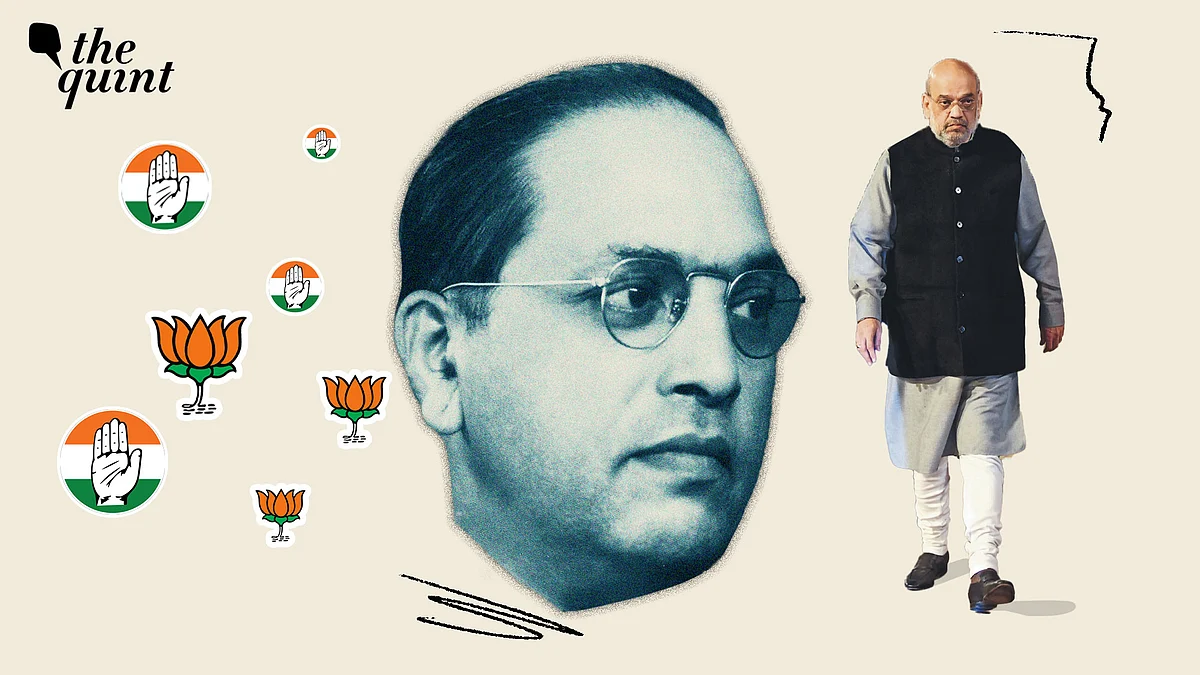
Congress vs Amit Shah on BR Ambedkar: All is Fair in War and Politics?
Ironically, the recent controversy surrounding Shah’s remarks on Ambedkar reflects a similar tit-for-tat strategy.

advertisement
The recent controversy over Home Minister Amit Shah's remarks on Dr BR Ambedkar during his Rajya Sabha speech has sparked a storm of selective outrage, primarily fueled by the Congress. The incident underscores a familiar pattern in Indian politics, where context is often sacrificed at the altar of political expediency.
The real issue isn’t whether the BJP respects the architect of the Indian Constitution, but whether Shah’s speech was genuinely disrespectful to Ambedkar or a critique aimed at Congress’s selective appropriation of his legacy.
However, the subsequent portion of his speech provides crucial context, where Shah acknowledged the importance of Ambedkar and highlighted the reasons for his resignation from Nehru's cabinet.
Shah argued that Ambedkar resigned due to dissatisfaction with the government’s handling of issues concerning Scheduled Castes and Scheduled Tribes, disagreement over foreign policy strategies, and opposition to Article 370.
Shah’s critique was aimed at Congress’ historical neglect of Ambedkar’s concerns rather than undermining the leader’s contributions.
The Congress’ outrage appears to be a strategic diversion to avoid confronting its own record on constitutional amendments and its history of suppressing dissent.
This episode highlights the need for a more nuanced debate on India’s constitutional history and the legacies of its architects. Reducing complex political and historical narratives to sound bites does a disservice to public discourse.
Instead of trading barbs, parties should engage in substantive discussions about the Constitution, Ambedkar’s vision, and their implications for contemporary India.
Revenge Moment Against BJP's Use of Manmohan Singh's Minority Comment
Eighteen years ago, in December 2006, then-Prime Minister Dr Manmohan Singh made a noteworthy statement at the 52nd meeting of the National Development Council.
He said, "We will have to devise innovative plans to ensure that minorities, particularly the Muslim minority, are empowered to share equitably in the fruits of development. They must have the first claim on resources. The Centre has a myriad of other responsibilities whose demands will have to be fitted within the overall resource availability."
This statement, aimed at addressing systemic inequities, has been repeatedly twisted by BJP leaders, including Prime Minister Narendra Modi. They have framed it as evidence of Congress prioritising Muslims above all other communities.
During the 2024 Lok Sabha election campaign, Modi once again invoked this remark, using it to criticise Congress's alleged appeasement politics.
However, this selective interpretation ignores the broader context of Singh’s comments, which sought equitable distribution of resources to uplift marginalized communities.
Problem With Such Selective Outrage
In his recent speech at the Rajya Sabha during the Constitution debate, Home Minister Amit Shah made several noteworthy statements that warrant serious discussion.
One of the key points he raised was the BJP’s commitment to implementing a Uniform Civil Code across the country, following the example of Uttarakhand. Shah also accused the Congress of opposing welfare measures for Other Backward Classes (OBCs) while pushing for reservations for Muslims by exceeding the 50% limit set by the Constitution.
Shah stated, “I want to tell the people of the country that reservation on the basis of religion exists in two states of the country... which is unconstitutional. It has been made clear in the Constitution that there will be no reservation on the basis of religion. But when Congress was in power in both states, reservation was given on the basis of religion. Congress wants to give reservations to Muslims by increasing the quota limit beyond 50 percent. But today I once again say with responsibility in this House that as long as there is even a single BJP MP, we will not allow reservation on the basis of religion.”
BJP's Worry
There's no denying that the BJP is on the back foot after Home Minister Amit Shah's controversial comment about Dr. BR Ambedkar. It's not just about the comment or the selective clip; it's about the tone and manner in which he spoke about Ambedkar. The BJP is still reeling from the setback of the 2024 general election, where it performed poorly in constituencies with a significant Dalit population.
India has 84 reserved seats for Scheduled Castes (SC). In the 2019 Lok Sabha elections, the BJP won 46 of these seats, while the Congress secured only six. However, in the 2024 general election, the BJP's tally dropped to just 29 SC-reserved seats, with the Congress winning 20 and the INDIA bloc allies securing 33. This shift underscores why any narrative portraying the BJP as anti-Ambedkar is detrimental to the party.
This is why the party took the issue seriously. Prime Minister Narendra Modi quickly defended Amit Shah on Twitter, and Shah himself held a press conference to clarify his remarks.
In politics, perception is everything. The BJP's swift response to the controversy highlights the high stakes involved in maintaining its image and voter base.
As the party navigates these turbulent waters, it must tread carefully to avoid alienating key demographics and ensure its narrative aligns with the values and aspirations of its supporters.
(The author, a columnist and research scholar, teaches journalism at St. Xavier’s College (autonomous), Kolkata. His handle on X is @sayantan_gh.)
- Access to all paywalled content on site
- Ad-free experience across The Quint
- Early previews of our Special Projects
Published: undefined